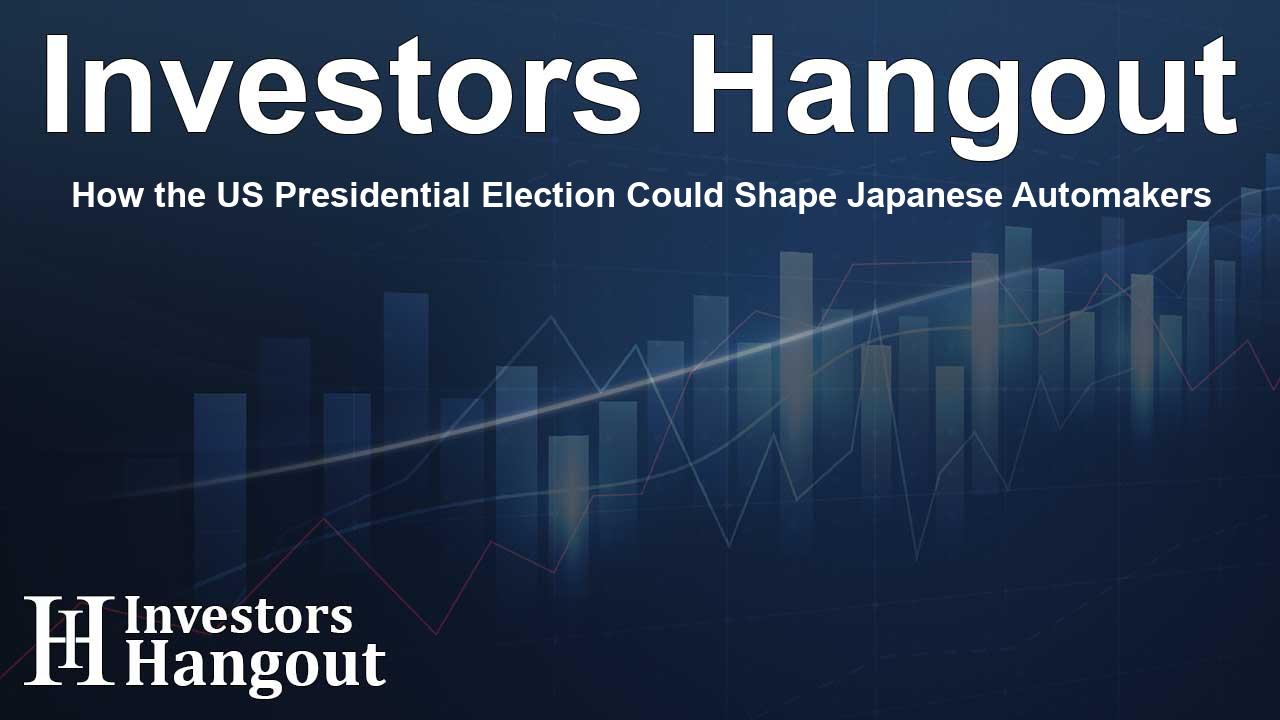How the US Presidential Election Could Shape Japanese Automakers

The Political Landscape for Japanese Automakers
The upcoming U.S. presidential election in November carries significant implications for Japanese automakers, influencing policies on climate change, trade dynamics, and industry regulations. As the candidates share their viewpoints, the automotive sector is paying close attention to how their positions may affect future operations.
Experts Analyze Election Impacts
Analysts are suggesting that the election's outcome, whether it favors Donald Trump or Kamala Harris, could lead to major shifts in the regulatory environment for Japanese manufacturers. Each candidate's perspective on electric vehicle (EV) adoption and environmental regulations could either foster growth or create further challenges for the industry.
The Impact of a Trump Presidency on Regulations
If Trump were to win, there could be a relaxation of strict federal regulations regarding greenhouse gas emissions and Corporate Average Fuel Economy standards. Historically, Trump has supported a market-driven approach to the adoption of EVs, indicating that incentives like tax credits might be reduced or even eliminated. This could have mixed effects: while it might lessen the immediate pressure to increase EV production, it could also undermine the long-term competitiveness of Japanese brands as the industry shifts toward electrification.
Trade Concerns with Trump
Trade relations would also come into play, as Trump's protectionist policies might result in higher tariffs, especially on cars built in Mexico. Manufacturers such as Mazda and Nissan, which have major production facilities there, might face increased costs, making their vehicles less competitive in the U.S. market.
What a Harris Administration Could Mean
Alternatively, if Kamala Harris wins, we can expect a continuation of strict climate policies aimed at promoting a more sustainable automotive future. Under Harris's administration, tough greenhouse gas regulations would likely be enforced, along with adherence to California’s ambitious Advanced Clean Cars II standards.
Compliance Challenges Ahead
This regulatory framework may create significant hurdles, particularly for companies that haven’t yet transitioned to electric and zero-emission vehicles. Manufacturers like Subaru and Nissan, which are currently behind in ZEV sales, could face hefty fines—potentially up to $20,000 for each non-compliant vehicle.
How Leading Automakers Are Preparing
On a positive note, manufacturers like Toyota and Honda, which have made substantial investments in hybrids and EVs, may find themselves in a stronger position to adapt to these regulations. Toyota’s strategy, emphasizing a diverse approach to fuel sources, could allow it to thrive as the marketplace evolves.
Future Market Developments and Considerations
Even if Harris is elected, a significant gap remains between projected regulatory targets and the current rate of EV sales, which are still a small slice of the total U.S. market. This slow pace of market development may prompt regulatory reassessments down the line.
The rising demand for electric vehicles will present ongoing challenges for automakers, especially with tight deadlines. However, Harris's firm commitment to stringent climate policies suggests that regulatory pressures for compliance will likely persist.
Trade and Supply Chain Obstacles
Trade policies are set to play a critical role, particularly in relation to China. The current administration's efforts to reduce dependence on Chinese components for EVs could complicate matters for automakers, American or otherwise. Japanese manufacturers will need to carefully navigate these supply chain challenges to stay competitive.
Conclusion: Charting the Future
As we approach the election, both Japanese automakers and industry analysts are closely watching the political landscape unfold. Whether Trump or Harris comes out on top, the consequences for the automotive sector will require strategic adjustments and innovative approaches to remain competitive in a continuously changing industry.
Frequently Asked Questions
What are the potential effects of the US election on Japanese automakers?
The election results could reshape regulations concerning EV adoption and trade policies, significantly affecting how automakers operate.
How might a Trump victory impact regulations?
Trump might ease federal emissions regulations, which would reduce immediate pressures on automakers to transition to electric vehicles.
What challenges could a Harris administration present?
A victory for Harris would likely lead to stricter environmental regulations, requiring more compliance from automobile manufacturers.
How do trade policies influence Japanese automakers?
Increased tariffs on imports could bring risks for manufacturers with considerable production in Mexico, raising their operational costs.
Which Japanese automakers are best prepared for upcoming regulations?
Manufacturers like Toyota and Honda, with robust EV strategies, are in a better position to meet future regulatory challenges.
About The Author
Contact Olivia Taylor privately here. Or send an email with ATTN: Olivia Taylor as the subject to contact@investorshangout.com.
About Investors Hangout
Investors Hangout is a leading online stock forum for financial discussion and learning, offering a wide range of free tools and resources. It draws in traders of all levels, who exchange market knowledge, investigate trading tactics, and keep an eye on industry developments in real time. Featuring financial articles, stock message boards, quotes, charts, company profiles, and live news updates. Through cooperative learning and a wealth of informational resources, it helps users from novices creating their first portfolios to experts honing their techniques. Join Investors Hangout today: https://investorshangout.com/
The content of this article is based on factual, publicly available information and does not represent legal, financial, or investment advice. Investors Hangout does not offer financial advice, and the author is not a licensed financial advisor. Consult a qualified advisor before making any financial or investment decisions based on this article. This article should not be considered advice to purchase, sell, or hold any securities or other investments. If any of the material provided here is inaccurate, please contact us for corrections.
